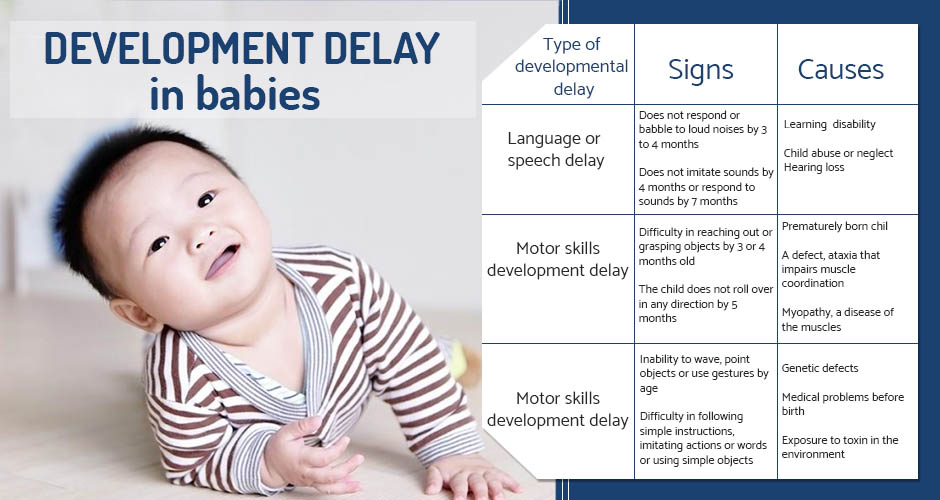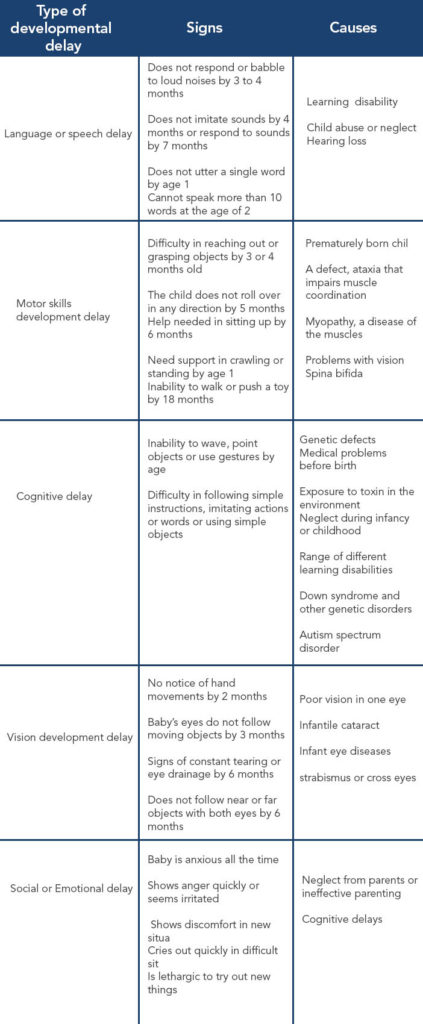
Development Delay in Babies: Signs, Causes & Treatment
A really exciting part of your parenting journey is for sure, eagerly awaiting and then celebrating the different milestones of your baby. Right from when they begin to sit or babble to when they begin to crawl and then walk, every single milestone feels like a little win for the parents. However, it is natural to worry whether your baby’s development is on track in case some milestones get delayed. Are you also worried about your baby's development delay? Mothers also often get to hear insensitive questions like, “Your kid hasn’t learnt to speak yet?”, “Does he walks properly?”, “Hasn’t he tried to roll over yet?”. Such comments can hurt a mother’s sentiments, learning his child is lagging behind in passing several milestones.
What is Development Delay?
Development delay means a major or minor delay in reaching the developmental milestones in the optimum age ranges. Lagging behind temporarily isn’t called development delay. It can occur in one or more areas, for example, gross or fine motor, language, social or thinking skills. In India, 10% of children are affected by developmental delays. Every child has his own pace of reaching the milestones. Skills like walking or talking are developed in most children without any issues. When such milestones aren’t achieved by the child within the normal age range, it signifies developmental delay. There are proper guidelines prescribed by paediatric researchers for diagnosis of development delay. Parents are usually the first ones to notice the slow progress in their child. A paediatrician might also pick up a delay during an appointment. However, there might be several visits required to confirm that the delay isn’t temporary lag.Types of Development Delay, their Signs and Causes:
Infants and young children can suffer from different types of developmental delays, such as:#1. Language or speech delay:
Most common form of development delay. It refers to having difficulty in communicating verbally or in expressing and receiving information. Signs to watch for in a baby:- Does not respond or babble to loud noises by 3 to 4 months
- Does not imitate sounds by 4 months or respond to sounds at all by 7 months
- Does not utter a single word by age 1
- Cannot speak more than 10 words at the age of 2
- A disability in learning
- Situation like child abuse or neglect
- Hearing loss in children due to infection or a result of certain medications, trauma or genetic disorders
#2. Motor skills or movement – In this, the child’s ability to walk or crawl is affected.
Signs to watch for in a baby:- Difficulty in reaching out or grasping objects by 3 or 4 months old
- The child does not roll over in any direction by 5 months
- Help needed in sitting up by 6 months
- Need support in crawling or standing by age
- Inability to walk or push a toy by 18 months
- Prematurely born children with improper muscle development
- A defect, ataxia that impairs muscle coordination
- Myopathy, a disease of the muscles
- Problems with vision
- Spina bifida, a genetic condition causing partial or total paralysis of the lower part of the body
#3. Cognitive –It refers to problems with thinking and sometimes as intellectual disability as well.
Signs to watch for in a baby:- Inability to wave, point objects or use gestures by age 1
- Difficulty in following simple instructions, imitating actions or words or using objects like spoon or hairbrush by age 2
- Due to genetic defects
- Medical problems before birth
- Harmful exposure to toxin in the environment
- Neglect during infancy or childhood
- Range of different learning disabilities
- Down syndrome and other genetic disorders
- Autism spectrum disorder
#4. Vision – Vision delay means blurriness in baby’s eyes within his or her first 6 months.
Signs to watch for in a baby:-
- No notice of hand movements by 2 months
- Baby’s eyes do not follow moving objects by 3 months
- Signs of constant tearing or eye drainage by 6 months
- Does not follow near or far objects with both eyes by 6 months
- Poor vision in one eye
- Infantile cataract – clouding of the eye’s lens
- Eye disease that affects infants such as retinopathy of prematurity
- A condition called strabismus or cross eyes
#5. Social or Emotional delay – this form of delay causes problems with the child’s ability to interact with adults or even other children.
Signs to watch for in a baby:- Baby is anxious all the time
- Shows anger quickly or seems irritated
- Shows discomfort in new situations
- Cries out quickly in difficult situations
- Is lethargic to try out new things
- Neglect from parents
- Ineffective parenting or attachment problems
- Cognitive delays
- Not known cause
 Also Read: 7 ways to protect the eyesight of your child
At times, there can be a delay seen in many or all of these areas. It is referred as “global developmental delay.” These delays can be noticed in more than one aspect right from infancy to toddler years.
Developmental delays in children, may be possible even if you had a healthy pregnancy. If you notice any of the symptoms of a developmental delay in your baby, speak to your doctor. There are number of treatments and support available. Better be safe than sorry!
Want to share your mommy experience with other moms through words or images? Become a part of the Moms United community. Click here and we will get in touch with you
Also Read: 7 ways to protect the eyesight of your child
At times, there can be a delay seen in many or all of these areas. It is referred as “global developmental delay.” These delays can be noticed in more than one aspect right from infancy to toddler years.
Developmental delays in children, may be possible even if you had a healthy pregnancy. If you notice any of the symptoms of a developmental delay in your baby, speak to your doctor. There are number of treatments and support available. Better be safe than sorry!
Want to share your mommy experience with other moms through words or images? Become a part of the Moms United community. Click here and we will get in touch with you
null